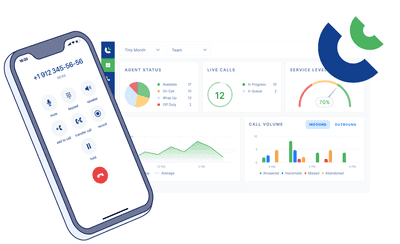What Small Businesses Need to Consider When Choosing a Cloud Phone System
Learn the key factors that your small business should consider when choosing a cloud phone system.
4 min read

Eric Hansen
Dec 21, 2020

In this blog post, you’ll learn the key factors that your small business should consider when choosing a cloud phone system. These factors boil down to five things: functionality, flexibility, reliability, security, and cost.
Functionality
The first thing to check is whether a particular cloud phone system offers the features you need today — as well as the ones you’re likely to need tomorrow. Think about empowering your teams to both collaborate internally and connect externally with clients, prospects, partners, and so on.
Can your teams easily set up conference calls, set up call forwarding, and transfer and forward calls? Can you create polished greetings for incoming calls and establish a multi-level interactive voice response (IVR) system that directs callers to the right teams?
Does the solution offer toll-free numbers, local numbers in other countries, and an app that enables your team members to work right from their smartphones no matter where they happen to be?
Flexibility
It’s also important to find a cloud phone system that will integrate smoothly with your other business productivity applications. Think about how much time you will save (and how many mistakes you will avoid!) if you are able to import contact information from your CRM. Consider how much more productive your teams will be if they can make calls right from the CRM interface instead of dialing manually.
Again, be sure to consider not only today but tomorrow: Make sure the system doesn’t lock you in to particular tools, since your preferences will likely evolve over time as your business grows and better tools come on to the market.
Make sure the system doesn’t lock you in to particular tools
Reliability
Phone communication remains the backbone of the day-to-day activities of most businesses today, so the cloud phone system you choose must be reliable.
Wait just a minute, you might be thinking. Isn’t the most reliable choice a traditional landline system? Actually not. Landlines depend on physical connections, usually copper cables, which are extremely vulnerable to natural disasters, vandalism, and general wear and tear. Repairs can be painfully slow, which definitely puts your business at risk of extended outages of your phone service.
Cloud PBX systems are not invulnerable to outages, of course, but providers have strategies that can ensure virtually zero downtime. One of the most common is geographic redundancy: The provider maintains servers in several different physical locations and ensure that all of them contain the same software and data. That way, if one fails for whatever reason, another can take its place almost instantly, giving you uninterrupted service.
Cloud PBX systems are not invulnerable to outages, of course, but providers have strategies that can ensure virtually zero downtime.
Security
Security is a crucial concern when choosing any IT solution, particularly one that involves sensitive customer data. Two of the most critical security measures to look for in a cloud phone system are multifactor authentication (MFA), which keeps a stolen password from becoming a security incident, and encryption, which helps keep your data safe and your calls confidential.
Cost
Cloud phone systems in general are far less costly than on-premises solutions, since you don’t have to purchase expensive equipment and pay a team of skilled experts to maintain it — but not all cloud phone systems are the same.
Be especially wary of hidden costs. Is the “free” trial truly free? Do you have to purchase expensive new VoIP-enabled phones? Must you choose among bundles, all of which force you into buying features you’ll never use? Will there be surprise charges, taxes, or fees on your bill? Can you leave whenever you like without a penalty?
Final thoughts
Doing your due diligence and diving into these key criteria might seem like a lot of work. Why not take the easy route and simply go with a vendor that has been around for ages? Why even bother looking at newer players in the market?
The answer is simple: Technology has advanced rapidly, which means long-standing companies are often stuck playing catch-up. They are highly dependent on a large legacy systems and cumbersome processes, and all too often they try to contort them to fit modern needs. Companies born in the digital age don’t have all that baggage, so they can build cutting-edge solutions that are cloud-native, freely choosing the latest and greatest technologies instead of being hamstrung by outdated hardware, software, and modes of thinking.
What’s more, younger companies are also keenly aware of the value of each customer and the need to build a strong reputation. For example, you probably won’t have to navigate a veritable labyrinth of voice mail options to get the help you need. Plus, because their solutions are leaner and cleaner and their processes aren’t laden down by bureaucracy, they often fix issues faster and better than industry behemoths.
So, instead of unilaterally ruling out younger companies, do your homework: Dive into exactly how a particular cloud phone system delivers on the five key areas of reliability, functionality, flexibility, security, and cost. Then insist on a free trial to see for yourself how their claims hold up.
